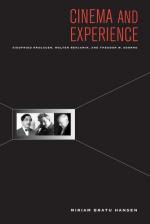|
This section contains 4,919 words (approx. 17 pages at 300 words per page) |

|
SOURCE: “A Taste of Honey: Adorno's Reading of American Mass Culture,” in European Readings of American Popular Culture, edited by John Dean and Jean-Paul Gabilliet, Greenwood Press, 1996, pp. 201-11.
In the following essay, Maase examines what he sees as misreadings of Adorno's theories on mass culture in America.
During the 1950s, Max Horkheimer and Theodor Adorno, together with other European emigrants to the United States such as Hannah Arendt, Günter Anders, and Leo Löwenthal, became protagonists of the theoretical critique of contemporary mass culture.1 Their philosophical study on the “Dialectic of Enlightenment” was first published in German in the United States in a mimeographed version in 1944; slightly revised, it came out as a book in Amsterdam in 1947. Without a doubt, this essay has proved to be one of the most influential intellectual works in the second half of our century. The broad reception, however, inevitably implied...
|
This section contains 4,919 words (approx. 17 pages at 300 words per page) |

|


